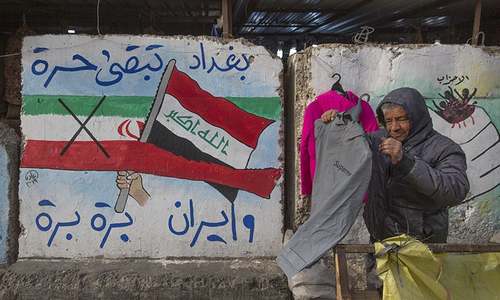AFTER several days of high drama in the Middle East following America’s assassination of Iranian Gen Qasem Soleimani in Baghdad last week, where at one point it seemed the region was poised on the brink of another disastrous war, the temperature came down several notches on Wednesday.
The day had started with a bang, quite literally, as news broke of Iranian missile strikes targeting two American bases in Iraq. It seemed the moment many had feared was here.
However, later in the day Donald Trump — whose rash decision had ignited this latest episode — spoke to the cameras, declaring that “all is well”. It may have been an anticlimax, but a welcome one, and the international community heaved a sigh of relief.
Read: Trump tones down war rhetoric, announces more 'punishing sanctions' on Iran
Iranian media reported “80 American terrorists” had been killed in the strikes; Trump claimed “all of our soldiers are safe”.
Regardless of the true picture on the ground, it was clear that both sides had made their public statements and backed down, for now.
The Trump administration has, till date, been big on bravado and light on solid strategic policy, with the US president’s Twitter statesmanship confounding allies and foes alike.
However, in this case perhaps wiser members of the administration have prevailed on their boss that a full-blown war with Iran is not in America’s interest.
Though there is no match where technological advantage and firepower between the American and Iranian militaries are concerned, with the former having a clear edge, Trump’s generals know that Tehran can cause major havoc to US interests in the Mideast.
The Iranians have said previously that American bases in the region are within their reach, and a brief preview of this was witnessed in the Iraq strikes.Moreover, there are also signs that America’s Gulf Arab allies are genuinely panicked that if the situation escalates, Tehran’s missiles could rain down on US bases on their territory.
On the other hand, the Iranian establishment must also have realised that while it needed to take public action to avenge Soleimani’s death, total war against America would be inadvisable considering Tehran’s feeble economic position and relative weakness compared to the US military machine. Therefore, both sides have managed to save face and avert a bloody showdown.
From here on, the international community will need to play a greater role to de-escalate the situation between Washington and Tehran. If the US continues to advocate for regime change in Iran and tighten an already suffocating sanctions regime against the country, it is highly unlikely the Islamic Republic will soften its tone. Moreover, Tehran should reconsider leaving the nuclear accord; and it should keep the doors of dialogue open, as in the arena of international relations situations can and do change very quickly. The danger of conflict has receded, but by no means is the situation in the Mideast back to normal.
Published in Dawn, January 10th, 2020













































